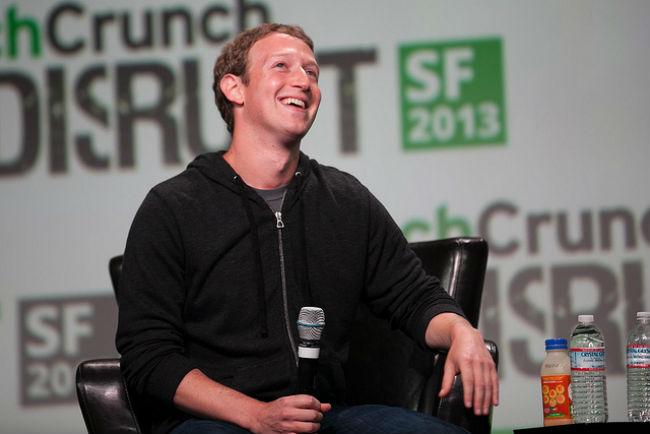
Mark Zuckerberg sat down for an interview with former TechCrunch baron Michael Arrington during the company’s TC Disrupt conference yesterday in San Francisco. The ever-hoodied Facebook CEO put his usual positive spin on the company’s past year, but made some especially interesting remarks that reveal Facebook’s plans for the future.
He believes Facebook is at a crossroads, perhaps now more than ever — and they’re aiming toward a world where everyone uses the website.
After talking about how he and his friends started small because they didn’t believe they had the capability to do something on a global scale, Zuckerberg started talking about the social network’s future goal: connecting everyone. “Now the focus for us is actually re-tooling, and you’re going to see us re-tooling the in the company in a number of ways to go take on a lot of harder problems that fulfill this mission. For example, connecting the next five billion people. It’s going to be really hard, because a lot of people don’t have Internet access.”
Zuckerberg is referencing his recently launched Internet.org, an initiative for universal access to the Internet. It’s an insanely ambition plan but it’s one that would catapult Facebook into an even more crucial global communications role. The initiative hasn’t actually, you know, done anything yet besides amass the support of Ericsson, MediaTek, Nokia, Opera, Qualcomm, and Samsung.
“Over the next five or 10 years, we want to take up a road map to understand everything in the world.”
So… not only does Facebook want to spend the upcoming decade making sure everyone in the world has Internet access, it also wants to map the known world using data. Somebody over there dipped their goal journal in a witch’s brew of bananas optimism. This statement speaks to the emphasis Facebook is putting on Graph Search — and it hints at how badly Zuckerberg wants to make Facebook a discovery tool to rival traditional search engines.
“You just have to say focused on doing the right stuff, and sometimes it might take the market a little while to catch up.”
Aside from broadcasting his extremely lofty two-pronged strategy to connect and understand the world, Zuckerberg emphasized the company’s success with mobile during the interview. “Last year when I was here, we laid out the plan for mobile, and everyone thought that mobile would be this disastrous thing for Facebook,” Zuckerberg said. He was quick to point out Facebook’s triumphant reversal of fortune when it came to monetizing mobile. This section of the interview made two things clear: One, Zuckerberg likes to gloat a little bit, and two, mobile is absolutely crucial to Facebook. And Zuckerberg’s belief that the market will eventually come around if you make a good product underscores a point he made later in the interview about Facebook Home…
“One of the toughest things is determining when something isn’t going to work versus just hasn’t worked yet.” Despite the lackluster response, Zuckerberg still believes in Home.
Zuckerberg admitted that its mobile products – ahem – tanked last year and prior to that, and he spoke about how they struggled to fix the products. “We took a lot of shit because we weren’t focused on making money on mobile, and I was focused on making sure the experience was better first,” he said. Later in the interview, Arrington flat-out asked Zuckerberg if he considered Home a failure. Zuckerberg said that reception had been cooler than he’d hoped, but emphasized the aspects of the software that people did like — Chatheads. He also noted that Facebook is integrating Instagram into the Home lockscreen in response to feedback from users asking for content from more places than Facebook. It sounds like the company won’t be abandoning its Home hopes anytime soon. “I still fully believe that this is something that people will want over time,” he said.
“I think the government blew it.” Zuckerberg believes the government has failed in its role to protect its citizens.
Arrington spoke to user concerns that the NSA will get ahold of Facebook’s immense user data. He asked Zuckerberg what he thought personally about privacy issues and the role of the government. He criticized the government’s excuse that it was only spying on foreigners, and emphasized Facebook’s demands for more transparency. “I wish that the government would be more proactive about communicating — we weren’t psyched that we had to sue,” he said.
It’s nice to know that Zuckerberg is taking the NSA situation seriously, but his comments were revealing for what he didn’t remark on — namely, the extent to which Facebook delves into user data to help with monetization campaigns. Sure, Facebook sued for increased government transparency, but it’d be interesting to hear how they morally square away stuff like Sponsored Stories, which put Facebook in legal trouble after users sued them to stop using their information to promote products.
Zuckerberg is getting more into political activism — and his friend Joe sounds cool.
Speaking about his decision to start teaching a middle-school class in order to gain perspective on education issues, Zuckerberg cited his wife Priscilla and his friend Joe as sounding boards — and said insight from Joe propelled his decision to start campaigning for immigration reform. “I talked to my friend Joe who is one of the smartest people i know in both technology and politics and the intersection between them,” he said. After this conversation, Zuckerberg started making phone calls to start an immigration reform initiative. Good job, Joe. Arrington’s next question after they discussed the immigration reform campaign asked Zuckerberg who should run Microsoft next, and his answer — basically a verbal love note to Bill Gates — underlined how Zuckerberg venerates the tech-king turned philanthropist.


